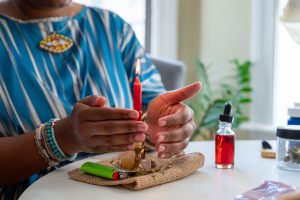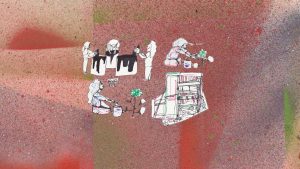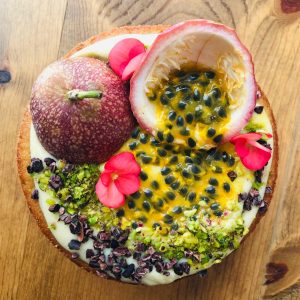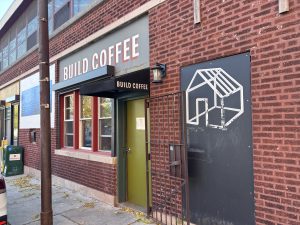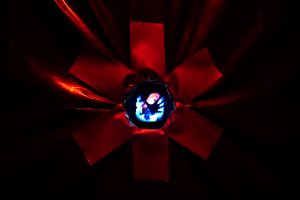Featured image: An illustrated graphic of a green chair on a beach with a black dog laying on it. Next to and above the chair are plants. To the right of the chair is an easel holding a painting. A light and dark green plant-like border circles the composition. Illustration by Tesh Silver.
In March of last year, as lockdown orders went into place, there was much collective confusion, complaining, and panic. Folks were upset about not being able to be in spaces centered around socializing, entertainment, or arts/culture/leisure. For many disabled folks, there was less panic around needing to stay home – we are used to this in fact. There was, however, much disabled frustration stemming from the fact that non-disabled folks refused to stay home, refused to think about collective wellness, and refused to unpack their ableist expectations of living in this world. For those of us with disabilities who are fortunate enough to have a place to call home, home is often our sanctuary, if not the only place that feels safe and accessible to us. I often talk to my disabled friends about what our disabled sanctuaries look like, both in reality and in our wildest fantasies. In this interview, which is the first in a series in which I get to chat with disabled artist friends, I had the pleasure of talking to the brilliant writer and artist, Rise, about the Pisces home they share with one of my favorite tiny animals on the planet. Enjoy…
You can read poetry by Rise previously published by Sixty here.
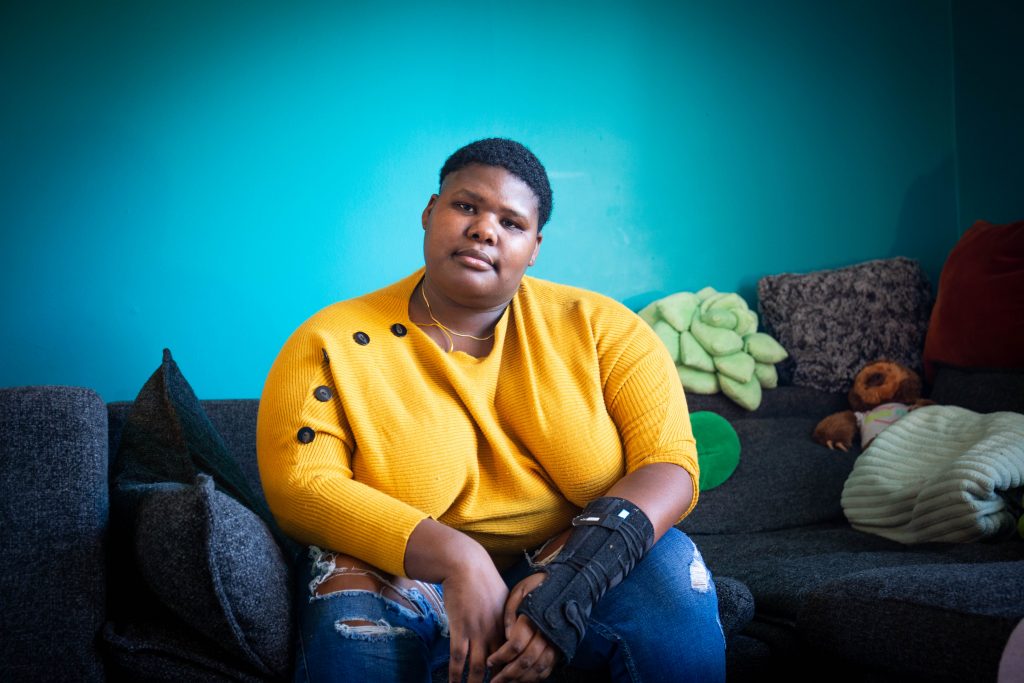
carrie sarah kaufman: What would you like to share about yourself as a human and an artist?
Rise: I’m a magician, an artist. I have to be. There’s no other option, right? To have survived right now? To have survived *gestures in the air* this? To continue. To have the nerve? MF I got me some nerve, okay. And it’s big. And I’m big, in spirit and body. I’m big bodied and have the nerve to love myself. I’m fat and have the nerve to love myself. I am in pain, all the time, and have the nerve to love myself. This is where I’m at right now. This is where I move from. This is what I move in. I think that I have survived the surveillance of my Blackness so long, that I’ve forgotten I’m a whole person. I think that I’ve survived my own surveillance, my own hypervigilance. I’ve forgotten I’m a whole person. I’ve remembered now, I am coming back. Imagination as coping can go a lot of ways. I’ve seen the side that reaches from the water and pulls you in. I write and love now from all the sides. I thought I had drowned. The sun lowered the water. The moon shifted the waves. Somehow, I came to the surface.
csk: Can you share a little bit more about your relationship to water and its energy?
Rise: Well, I am a Pisces sun, moon, and Venus—lol. So there’s the water right there just inherently. I was raised by three Sagittariuses, one Gemini, and two Libras—lol again. So, while there was love, there wasn’t much space for the currents, my currents—let alone the range of them. My theatrics were supported so long as they didn’t get too serious or soft. Except for my mom. She welcomed all the rain. My grandma, an Aries, used to say, “Gone head an’ cry, less rain that gotta fall.” And of course my Pisces self got worried about the trees. So I’d say my relationship to water has been a journey unwinding. Like headphones plucked out a backpack. Looks like chaos, seems fixable, doesn’t really let go until you decide to take your time. I know how to swim, how to float, but I can’t tread water. I sink, every time. And I think to myself, how is that even possible? The simplest part, the hardest for me? And I see the parallels in my life everywhere. I think I’m brilliant, truly. But ask me to wake up at seven every morning, or eat breakfast and not get nauseous, or brush my teeth without a pep talk first, and it’s a losing game.
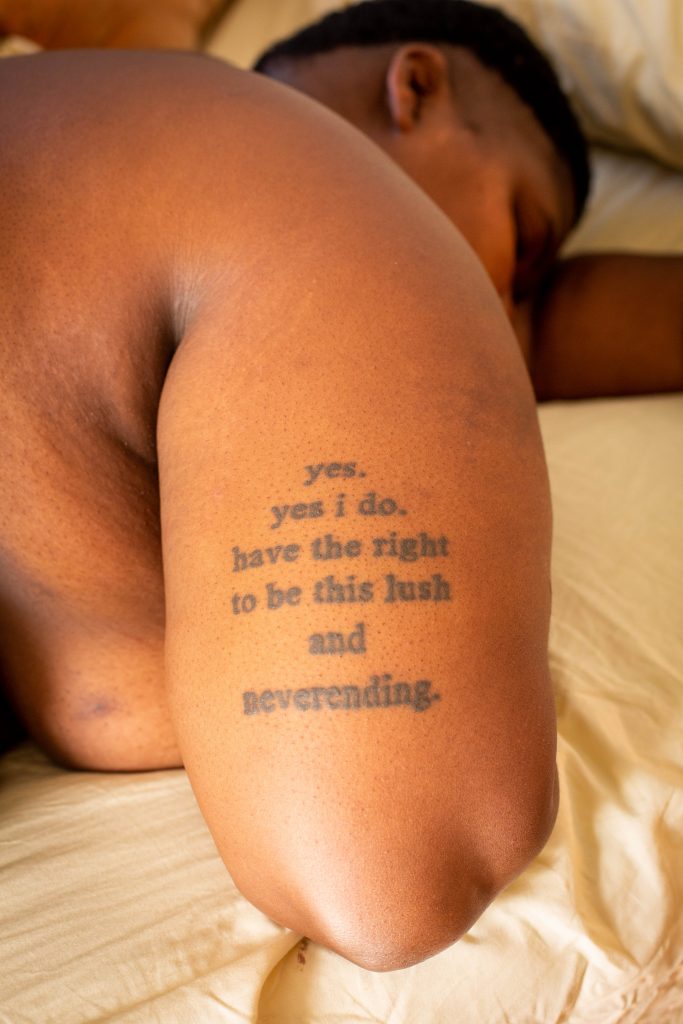
Rise: Water shows you what you are missing. Water shows you all that you can be. You tell me what element can mimic all the rest and still be authentic? There are none. An iceberg. Fog. Snow. Imprint of a leaf in winter. Water says, “Be. And see what you can become.” I’ve experienced much drought in my life, and when it felt safe to rain, I just….poured. And poured. And poured. And poured. And it felt urgent but natural. Trauma makes you used to extremes. But we see in our climate crisis today how dire balance is. I know how to swim…float…dive…splash. I know how to panic, swallow, spit, cough, breathe out my mouth, hold my air, blow bubbles. I know how to be in a heavy body made heavier by water. I am learning how to tread.
csk: What does disabled sanctuary mean to you? What is your disabled sanctuary?
Rise: Housing has been such a fucking issue in Chicago. I’ve seen more bugs in my past apartments than outside. I was so embarrassed of my space. I’ve been living in Chicago for 13 years and this is the first year I am actively inviting people over. This is huge for me. A disabled sanctuary should be free of bugs, able to be cool or warm for the person, have either no stairs or a ramp or an elevator. Definitely a tub, a LARGE LARGE tub. Cabinets for all the things. Sorting sorting sorting. Tiny bedrooms are silly. They serve no purpose but frustration. I want to serve no purpose at all and still be loved. Still deserve rest. even in a tiny bed. The closest I’ve gotten to sanctuary is my current place. It has cyan blue walls in the living room, forest teal in the dining, light grey for the bedroom, and lime green in the spare room/office/art space/dream coven. The kitchen is beige like sand at the beach. The bathroom is beige like sand at the beach. I live in an ocean, tropical rainforest with hardwood floors. I sit in my favorite chair, a green velvet plush with matching ottoman, when I do my work, when I write, when I watch things, when the edible hits and I doze off smiling. The central air cranks on in the middle of a meditation I’m leading and I’m annoyed and gratefully raise my voice. My bed fits so perfectly in the corner, that the moon watches me from her sky sheets. I fall asleep alone. But not lonely.
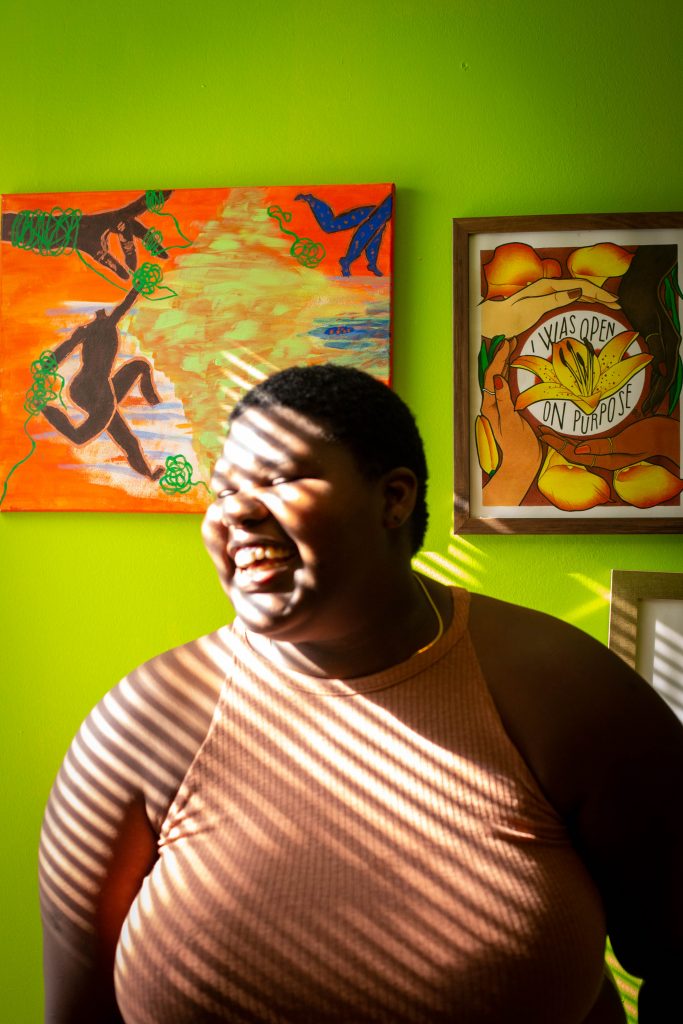
Rise: My walls are filled with pictures, affirmations, shelves that are filled with books, journals, planners, oils, bandaids, wound wash. There could be more windows, I’ll say that. My plants don’t seem to mind sharing space, seem to like the dimness of a non-stereotypical surface. Not all light is light, you know.
Jelly, my love, my fluffy puppy, watches me from a pillow across the room. I say goodnight to her heading to another, wake up to find her asleep in the small of my back. She’s not a cuddler but she plays hard. Reminds me to get up. Reminds me I haven’t played in a long while. I throw the ball again. We chase each other ‘til I collapse in laughter…heaving on the floor. It’s a consensual kinda downfall. A praise to my limits.
It’s evening. I’m back in my chair, off work, feet up on the velvet green goddesx again, watchin streaming shows, high as fuck.
I light the joint again. Hoping to get one last puff before I burn my lips. The best came last. As disable folk tend to do 🙂
Next to me, on the left arm of my chair, sits Thyme and Rosemary tea in a 12 oz mason jar, and a blue albuterol inhaler.
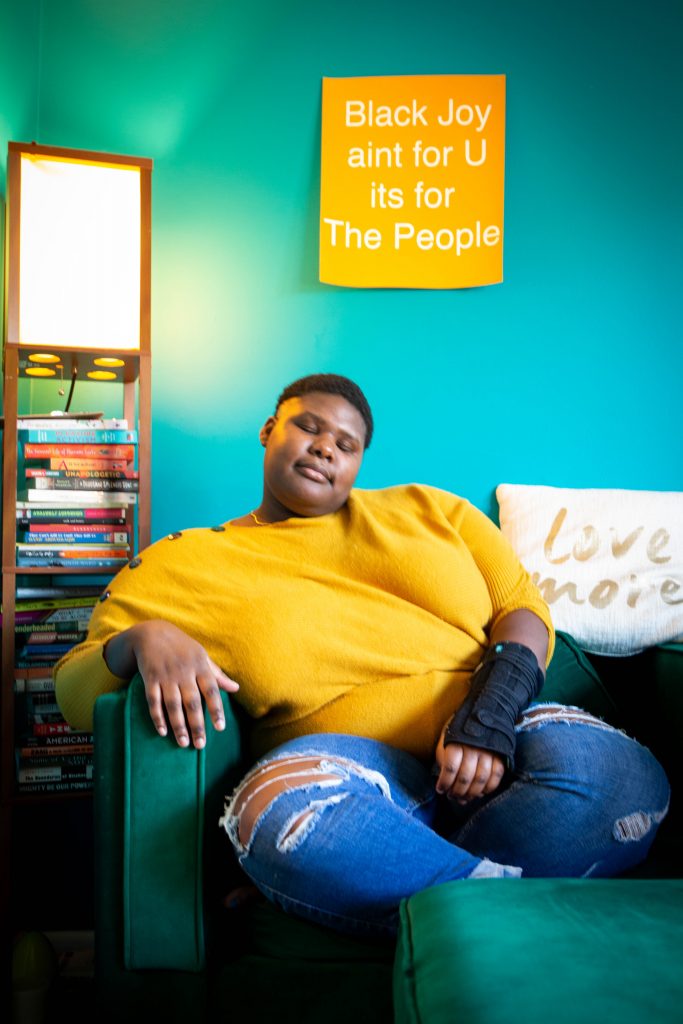
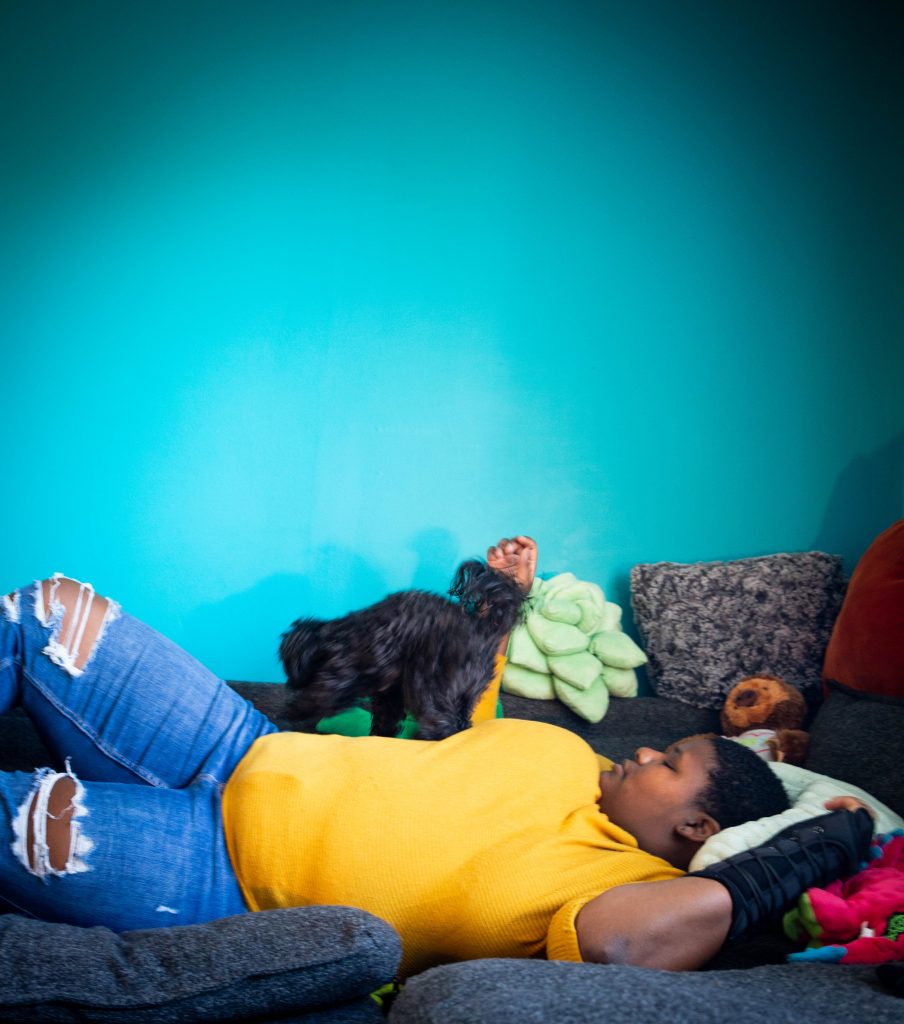
csk: What types of things do you like to create at home? What is the ideal environment for you when it comes to making art?
Rise: I love to paint. But, my word, it’s a lot of set up. Sometimes, because I have to “set up” so many things to manage my disabilities, I avoid making art. Other times, I like the methodical time it takes to prep for a thing that you have no idea how it’ll turn out. Oh. I also create so much movement. I dance in my underwear, tiddies out in the middle of the night when I can’t sleep. I only get annoyed about it when it comes to having to shower the sweat off. My ideal environment is clean—lol. I can’t have mess if I’m about to intentionally make a mess. That’s too much mess! Also, a cup of tea and/or water on the table waiting for me, my bluetooth speaker so my body can respond to the beats. And poetry, of course, is made any and everywhere. My original muse.
csk: I relate to this so much, the way that setting up and getting prepared to even make art sometimes feels like so much work that it’s not even worth it, especially when the windows of creativity and functionality feel very small. But thank you for the reminder that art, movement, poetry…that these things are actually everywhere. Where does poetry pop up for you?
Rise: Poetry pops up in the brain, when I’m destabilized and in a moment of reflection with a headache; any headache: light, hard, pulsing, stagnant, travelling, mirgane. My least favorite pain. It pops up in the teeth. A jaw clenched. I know release will make it better but I’m scared to let go. Poetry lives in the neurons. Bits of dew sprinkling every so often to keep the firing blazing but not deadly. There’s vulnerability and there’s opening as self harm, opening to your detriment. And there’s no shame either way. Anyone conscious to the machinery of their trauma knows the spectrum. But if you want to continue, you’re gonna have to put down the gun at some point. Be not like the country that raised you. Be everything said country fears.
Poetry also lives in the body, of course. Lives in my body. I am not a body. I am a person with a body. I wind my waist/hips/thighs/legs in my soft, soft bed on my soft, soft sheets to nothing at all. The sound of cars passing on wet streets, the never nightness of my open blinds, my breath. Poetry pops up as dance to remind me to breathe. Poetry pops up at 2am often and, if I did not go to sleep when I was supposed to, I can’t meet her. Poetry pops us as dance to remind me to breathe. I slip out of bed and, uncoordinated, I flow. I raise the speaker volume and, uncoordinated, I flow. All over the hardwood floor, the carpet, the couch. My knees ain’t that great but I gets down. Jelly drops a toy at my ankles and smiles. There’s a rhythm to my body that I feel and am working on witnessing but the world makes it hard. I still try. I pee, splash water where water is needed and get back in bed. Jelly throws a toy on my face and smiles. Then I write a story I’ve never heard before. A healer told me years ago, if your body shakes involuntarily, that’s trauma making its way out. So I let myself convulse now, staying present to the gift of movement, giving thanks when stillness comes. It’s all a journey of learning how to meet my needs, really.
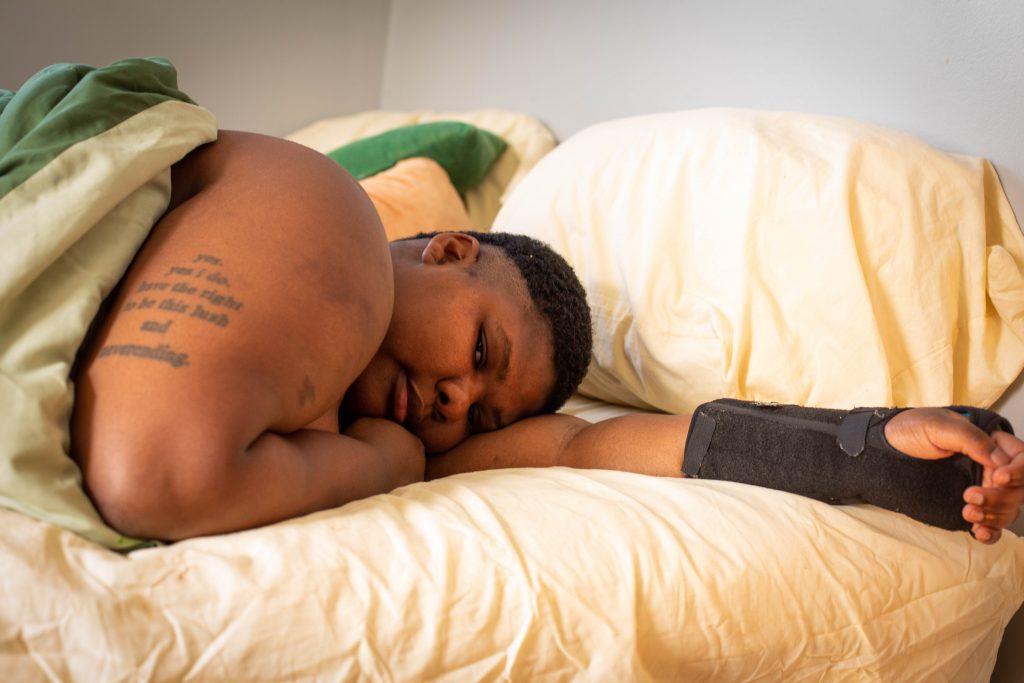
Rise: All my best work, I write in bed.
csk: Yes yes, I have said this too: all my best work, I write from bed. What ritual or other activities do you practice regularly at home?
Rise: I have a sacred morning practice that I’m choosing with great joy to keep to myself. 🙂 It be like that sometimes.
csk: Morning is such a sacred and powerful time for ritual. Thank you for that boundary and for choosing joy. We have talked about disabled wisdom and disabled anger before, in the context of the COVID-19 pandemic that we are still navigating and otherwise. What is your answer to folks who view staying home as a punishment and inconvenience, who have called staying home a burden and a prison, and who can’t wait to return to a normal that is so inaccessible to so many people? What disabled wisdom and/or anger do you offer for this moment?
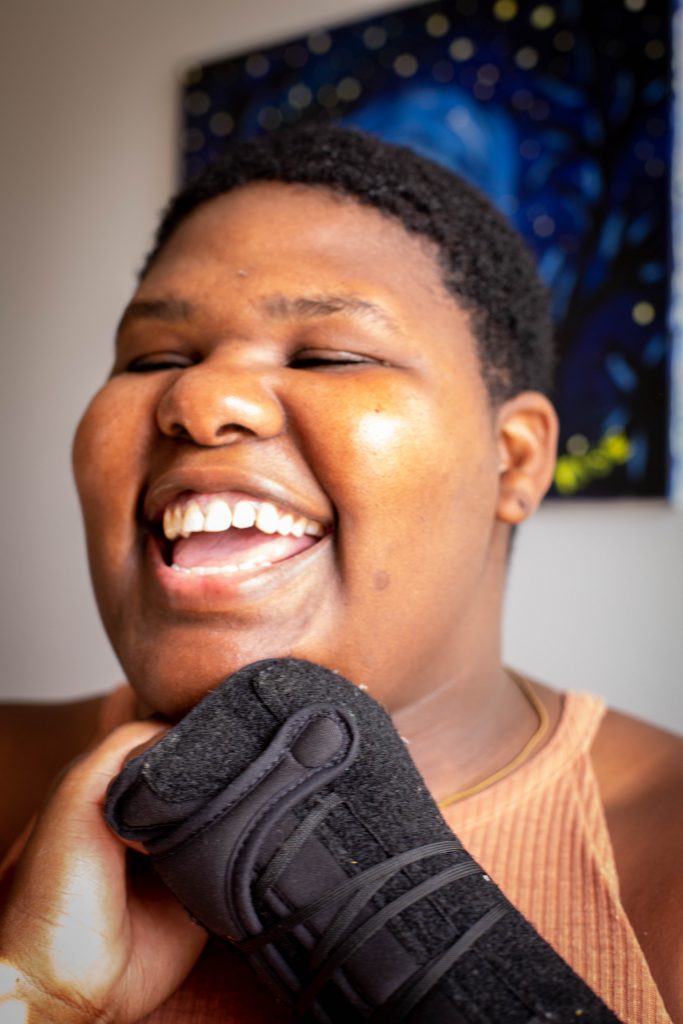
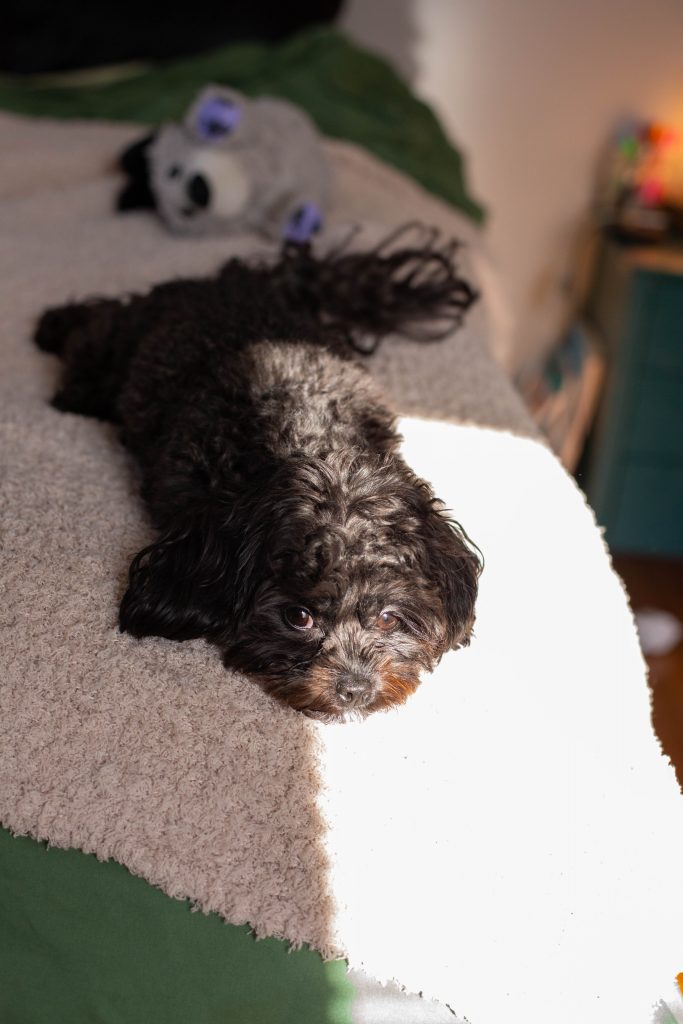
Rise: Oh, for heaven’s sake. Able bodied people are so ridiculous. It’s always so wild to me when folks describe an inconvenience or frustrating emotion using carceral or ableist language. It tells me a few things:
People think disabled folks are frustrating and an inconvenience. People feel so entitled to live their lives without consequence, to have to change for the sake of the collective, feels as dramatic as being forcefully incarcerated. We, as a collective, do not know how to manage grief. People with privilege cannot manage grief. When we cannot manage grief, we cannot manage nuance. When we cannot manage nuance, we are unable to articulate our valid feelings in ways that actually accurately describe what’s happening. When balance does not feel accessible, then we choose extremes. That’s the reason, though—not the excuse. There is no excuse for many folks’ behavior. I’ve removed and disconnected from a great deal of people. I do grieve those losses. The decisions that disabled people, particularly Black disabled people, have had to make in the last year and half; I’m enraged. I think about the folks where home did feel like a punishment. Adults who had to move back in with family and unhealthy dynamics. Young queer trans and nonbinary people whose only reprieve was school. People in abusive and dangerous relationships. However, I don’t remember seeing any of them complaining, only asking for help. It’s not the upset-ness for me. None of us wanted this. It’s the theatrics of it all, and the willingness to be an accomplice to murder by not wearing a mask, social distancing, and staying home in your apartment with air, heat, and food because you couldn’t have a fucking mimosa at some white-owned restaurant who probably doesn’t pay their staff a living wage. Get thee fuck.
I’m not returning. That’s the wisdom. It is both a privilege to choose this and a move to save and sustain my life. I do care who I lose in this process. I will always care. But fuck. We built a new world in a year and a half. We have proven we have the capacity to show up for each, even when exhausted, even when we can’t find the words. Why would I go back?
I take the knife out my chest. I rinse the blood off in Dawn and cool water. I burn lavender and watch the smoke dance around it. I open my windows. I cut fresh basil from a local garden and throw it in the pot. New life. It smells delicious.
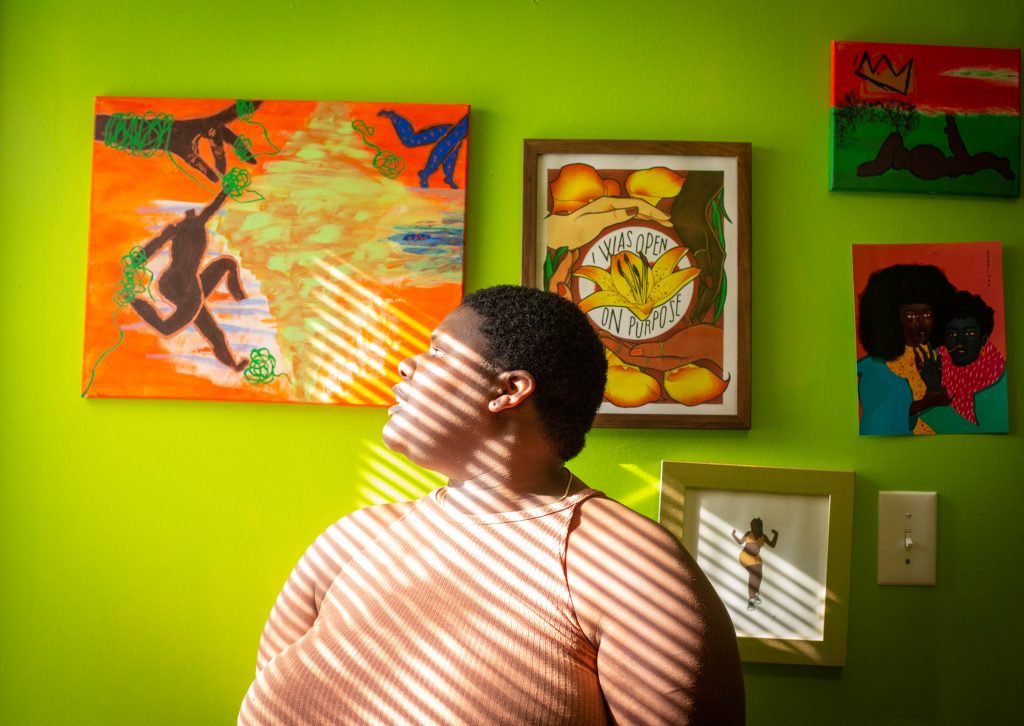
carrie sarah kaufman is a queer, multiply disabled, white, Jewish femme. she is a kitchen witch, a plant mama, an artist and survivor. cooking, ritual and poetry are her current tools for connection and healing. her work explores disabled embodiment, sexuality and intimacy as well as themes in Jewish magic and spirituality.

